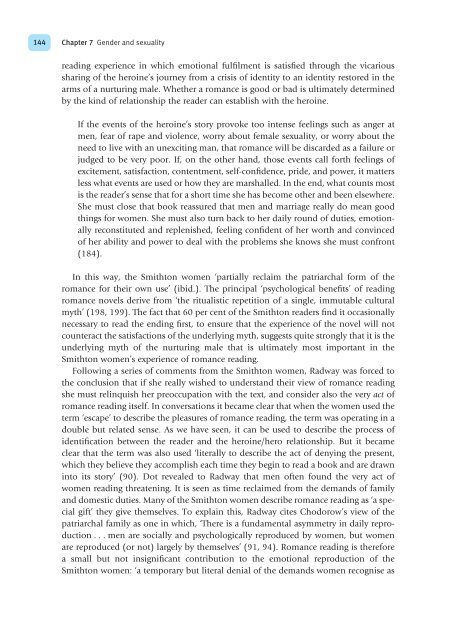Cultural Theory and Popular Culture
Cultural Theory and Popular Culture
Cultural Theory and Popular Culture
Create successful ePaper yourself
Turn your PDF publications into a flip-book with our unique Google optimized e-Paper software.
144<br />
Chapter 7 Gender <strong>and</strong> sexuality<br />
reading experience in which emotional fulfilment is satisfied through the vicarious<br />
sharing of the heroine’s journey from a crisis of identity to an identity restored in the<br />
arms of a nurturing male. Whether a romance is good or bad is ultimately determined<br />
by the kind of relationship the reader can establish with the heroine.<br />
If the events of the heroine’s story provoke too intense feelings such as anger at<br />
men, fear of rape <strong>and</strong> violence, worry about female sexuality, or worry about the<br />
need to live with an unexciting man, that romance will be discarded as a failure or<br />
judged to be very poor. If, on the other h<strong>and</strong>, those events call forth feelings of<br />
excitement, satisfaction, contentment, self-confidence, pride, <strong>and</strong> power, it matters<br />
less what events are used or how they are marshalled. In the end, what counts most<br />
is the reader’s sense that for a short time she has become other <strong>and</strong> been elsewhere.<br />
She must close that book reassured that men <strong>and</strong> marriage really do mean good<br />
things for women. She must also turn back to her daily round of duties, emotionally<br />
reconstituted <strong>and</strong> replenished, feeling confident of her worth <strong>and</strong> convinced<br />
of her ability <strong>and</strong> power to deal with the problems she knows she must confront<br />
(184).<br />
In this way, the Smithton women ‘partially reclaim the patriarchal form of the<br />
romance for their own use’ (ibid.). The principal ‘psychological benefits’ of reading<br />
romance novels derive from ‘the ritualistic repetition of a single, immutable cultural<br />
myth’ (198, 199). The fact that 60 per cent of the Smithton readers find it occasionally<br />
necessary to read the ending first, to ensure that the experience of the novel will not<br />
counteract the satisfactions of the underlying myth, suggests quite strongly that it is the<br />
underlying myth of the nurturing male that is ultimately most important in the<br />
Smithton women’s experience of romance reading.<br />
Following a series of comments from the Smithton women, Radway was forced to<br />
the conclusion that if she really wished to underst<strong>and</strong> their view of romance reading<br />
she must relinquish her preoccupation with the text, <strong>and</strong> consider also the very act of<br />
romance reading itself. In conversations it became clear that when the women used the<br />
term ‘escape’ to describe the pleasures of romance reading, the term was operating in a<br />
double but related sense. As we have seen, it can be used to describe the process of<br />
identification between the reader <strong>and</strong> the heroine/hero relationship. But it became<br />
clear that the term was also used ‘literally to describe the act of denying the present,<br />
which they believe they accomplish each time they begin to read a book <strong>and</strong> are drawn<br />
into its story’ (90). Dot revealed to Radway that men often found the very act of<br />
women reading threatening. It is seen as time reclaimed from the dem<strong>and</strong>s of family<br />
<strong>and</strong> domestic duties. Many of the Smithton women describe romance reading as ‘a special<br />
gift’ they give themselves. To explain this, Radway cites Chodorow’s view of the<br />
patriarchal family as one in which, ‘There is a fundamental asymmetry in daily reproduction<br />
. . . men are socially <strong>and</strong> psychologically reproduced by women, but women<br />
are reproduced (or not) largely by themselves’ (91, 94). Romance reading is therefore<br />
a small but not insignificant contribution to the emotional reproduction of the<br />
Smithton women: ‘a temporary but literal denial of the dem<strong>and</strong>s women recognise as
















